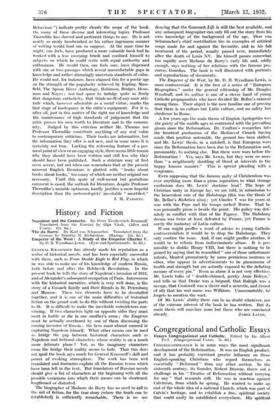History and Fiction
The du Barry. By Karl von Schumacher. Translated from tho By D. B. Wyndham Lewis. (Eyre and Spottiswoode. Ss. Cal.)
GENERAL Kmn SSNOPF has already made his reputation as a writer of historical novels, and has been especially successful with those, such as From Double Eagle to Red Flag, in which he was able to make use of his knowledge of modern Russia, both before and after the Bolshevik Revolution. In the present book he tells the story of Napoleon's invasion of 1812, and of Alexander's subsequent occupation of Paris. Interwoven with the historical narrative, which is very well done, is the story of a Cossack family and their friends in St. Petersburg and Moscow. These two elements have to be dovetailed together, and it is one -of the main difficulties of historical fiction on the grand scale to do this without twisting the parts to fit. It is difficult to Make the inevitable coincidences con- vincing. If two characters fight on opposite sides they must meet in battle or die in one another's arms ; the Emperor must be actually -overheard by one of them discussing the coming invasion of Russia ; the hero must almost succeed in capturing Napoleon hiniself: What other means can be used to :bridge the gap between historical characters such as Napoleon and fictional characters whose reality is on a much more intimate plane ? Yet, as the imaginary characters cross the bridge their reality seems to fade. That this does not spoil the book says much for General Krassneff s skill and poWer Of evoking atmosphere. The work has been well translated and footnotes explain all the Russian terms which have been left in the text. But translators of Russian novels should give a list of characters at the beginning with all the possible variations into which their names can be shortened, lengthened or distorted.
The biographer of Madame du Barry has no need to call in the aid of fiction, for the true story (where the truth can be established) is sufficiently remarkable. There is no use
denying that the Goncourt Life is still the best available, and any subsequent biographer can only fill out the story from his
own knowledge of the background of the age. Herr von
Schumacher's chief contribution lies in examples of satirical songs made for and against the favourite, and in .his full treatment of the period, usually passed over, immediately
after the death of Louis XV. He himself passes somewhat too rapidly over Madame du Barry's early life and, oddly, enough, says nothing of her relations with the famous pro-; caress, Gourdan, The book is well illustrated with portraits and reproductions of documents.
The Emperor of the West, by Mr. D. B. Wyndham Lewis, -is more controversial. It is the first of a series of " European
Biographies," under the general editorship of Mr. Douglas
Woodruff, and its author is one of a clever band of young Catholic propagandists who have divided Mr. pelloc's raiment
among them. Their object is the now familiar one of proving that there is no culture but Latin culture, and no safety but obedience to Rome.
A few years ago the main theme of English Apologetics was the gaiety of the middle ages as contrasted with the prevailing gloom since the Reformation. Dr. Coulton's researches into
the fanatical puritanism of the Mediaeval Church having made that position untenable, the ground has been shifted,
and Mr. Lewis' thesis, in a nutshell, is that European wars since the Reformation have been due to the Reformation and, presumably, to nothing else. But there were wars before the
Reformation ! Yes, says Mr. Lewis, but they were no more than " a neighbourly shedding of blood at intervals in the happy human manner." This is special pleading with a vengeance.
Even supposing that the famous unity of Christendom was ever anything more than a pious aspiration, to what strange confusions does Mr. Lewis' doctrine lead ! The hope of Christian unity in Europe lay, we are told, in submission to the benevolent rule of the Habsburgs (this was the thesis of Mr. Belloc's Richelieu also) ; yet Charles V was for years" at war with the Pope and his troops sacked Rome. That he was personally pious is beside the point. His policy was defi- nitely in conflict with that of the Papacy. The Habsburg dream was twice at least defeated by' France, • yet France is surely the mainstay of Latin culture.
If one might proffer a word of advice to young Catholic controversialists it would be to drop the Habsburgs. They only confuse the issue. And, if one might proffer another, it would be to refrain from indiscriminate abuse. It is per missible to dislike Henry VIII, but there is nothing to be gained by saying that he resembled " one of those unfortunate
infants, bloated prematurely by some pernicious nostrum or other, who appear in advertisements to be phenomena' of health and strength but are actually exposed to the deflating menace of every pin." Even as abuse it is not very effective: Mr. Lewis talks of " double-chinned, gawky Anne Boleyn," and tells us that Drake was a brigand, that Raleigh was a savage, that Crosimell was a slaver'and a neurotic, and (worst of all) that his real name was Williams. Unaccountably,' be forgets to mention the wart.
Of Mr. -Lewis' ability there can be no doubt whatever, poi- of the extreme interest of the book be has written. But its main thesis will convince none but those who are convinced


















































 Previous page
Previous page